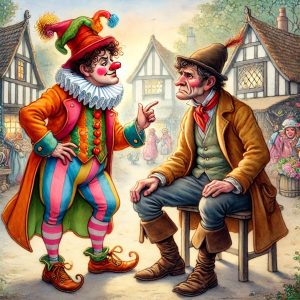
Introducing Dionysius, the Boy
Once upon a time in a quaint village nestled between rolling hills and a crystal-clear lake, lived a mischievous boy named Dionysius. He was known for his boundless energy and playful nature.
Dionysius and His Sheep
Dionysius was given the responsibility of taking care of the village’s sheep. He would lead them to the lush pastures every day and bring them back home in the evening.
The First Cry for Help
Dionysius, feeling a bit bored and craving some excitement, decided to play a trick. He took a deep breath and shouted as loud as he could, “Wolf! Wolf! Help me! The wolf is here trying to get the sheep!” Villagers dropped what they were doing and ran as fast as lightning towards the pasture. Their hearts pounded, and worry filled their faces. But upon arrival, all they saw was Dionysius, standing there, trying hard not to laugh.
“Why’d you fool us?” asked one villager, panting and upset.
“Just a little joke,” Dionysius replied with a smirk. “Thought we could all use some excitement.”
The villagers shook their heads and walked back to their homes, mumbling about wasted time and false alarms.
The Second Cry for Help
Not long after the first incident, Dionysius thought it would be funny to trick the villagers again. So, he cried out, “Wolf! Please, help! The wolf is back!” Once more, the villagers ran to save Dionysius and his sheep. But again, they found no wolf, just a boy who couldn’t stop chuckling at his own prank.
“This isn’t funny, Dionysius,” scolded the village elder. “If you keep lying, someday we might not come to help at all.”
“I promise, no more wolf stories,” Dionysius said, still snickering. “Won’t happen again.”
But the villagers walked away, less certain this time that they could believe him.
The Third Cry for Help
Then, on a day that seemed just like any other, a real wolf sneaked into the pasture. Its eyes were fixed on the unsuspecting sheep. Dionysius couldn’t believe his eyes. Panic struck him like lightning. “Wolf! There’s a real wolf this time! Please, come quick!” he screamed at the top of his lungs.
But back in the village, when folks heard Dionysius’s cries, they sighed and said, “There goes Dionysius again with his tales.”
No one moved a muscle to help. They all thought it was just another trick.
By the time the villagers realized their mistake, it was too late. They arrived at the pasture only to see the aftermath of the wolf’s visit. Sheep were missing, and Dionysius sat in the grass, tears streaming down his face, staring at the chaos around him.
The Boy’s Regret
After the wolf’s attack, Dionysius couldn’t help but feel a heavy weight in his heart. He understood, maybe for the first time, how his playful actions had serious consequences. “If only I had been truthful,” he thought, regret gnawing at him. This realization hit him harder than he expected. Night after night, he lay awake, thinking about how he could make things right. “Trust,” he whispered to the moonlit sky, “is not a game.”
The next morning, Dionysius woke up with a resolve stronger than any he had felt before. He decided to apologize to each villager personally, acknowledging his mistake and promising to be truthful henceforth. Some villagers were hesitant at first, but they saw the sincerity in Dionysius’s eyes. “Everyone deserves a second chance,” they murmured among themselves, slowly starting to forgive him.
The Lesson Learned
Months passed, and Dionysius kept his word. Rain or shine, he took care of the sheep with diligence and devotion, never once straying from the truth. The villagers noticed this change and began to trust him again. Kids in the village looked up to him, and parents used his story to teach their children about the importance of honesty.
One evening, as Dionysius led the sheep back into their pens, the village elder approached him. “Your actions have taught us all a valuable lesson, young man. Not just about trust, but also about forgiveness and the strength it takes to admit one’s mistakes,” the elder said, placing a gentle hand on Dionysius’s shoulder.
From then on, the tale of The Boy Who Cried Wolf was told and retold in the village. It served as a powerful reminder that trust is a treasure that, once lost, is hard to regain. But it also spoke of hope, showing that even the gravest of errors can lead to profound growth and redemption. Dionysius’s journey from a carefree boy to a wise shepherd remained a testament to this timeless lesson.






